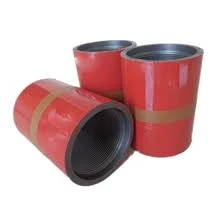teflon coupling
Understanding Teflon Coupling The Key to Efficient Mechanical Connections
Teflon coupling refers to the use of Teflon (polytetrafluoroethylene, PTFE) in mechanical couplings, which are components that connect two shafts or systems to ensure the transmission of power or motion. Teflon is renowned for its unique properties, including excellent chemical resistance, low friction, and high-temperature stability. These attributes make Teflon couplings highly valuable in various industries, including manufacturing, automotive, and aerospace. This article explores the characteristics, applications, advantages, and limitations of Teflon couplings.
Characteristics of Teflon Couplings
Teflon couplings are engineered to provide flexibility and reduce wear on machinery. They are typically designed using a combination of Teflon and other materials to enhance their mechanical properties. The elasticity of Teflon allows for slight misalignment between connected shafts, reducing the stress on the components and prolonging their lifespan. Additionally, Teflon's low coefficient of friction ensures smooth operation, minimizing energy loss during power transmission.
Another critical characteristic of Teflon couplings is their exceptional resistance to chemicals and extreme temperatures. Teflon can withstand temperatures up to 260 degrees Celsius (500 degrees Fahrenheit) without degrading. This makes it suitable for environments where various aggressive chemicals are present, as well as high-temperature applications.
Applications of Teflon Couplings
Teflon couplings find extensive applications across diverse fields due to their adaptability and reliability. In the pharmaceutical and food processing industries, Teflon's non-reactive nature ensures that it does not contaminate products, maintaining safety and quality. In these applications, Teflon couplings are commonly used in conveyor systems, mixers, and pumps.
In the automotive sector, Teflon couplings help in the efficient functioning of various components, including fuel lines and hydraulic systems. Their ability to resist wear and tear makes them ideal for high-performance vehicles, where durability is critical. Additionally, Teflon couplings are used in aerospace applications, where lightweight and high-strength materials play a crucial role in the performance and safety of aircraft.
Advantages of Teflon Couplings
teflon coupling

The use of Teflon couplings offers several noteworthy advantages. Firstly, their low friction properties lead to reduced energy consumption. This not only lowers operating costs but also contributes to environmental sustainability by minimizing energy waste.
Secondly, Teflon couplings require minimal maintenance, making them an economical choice for businesses. Their durability and resistance to wear reduce the need for frequent replacements, allowing companies to focus on production rather than maintenance.
Furthermore, Teflon couplings provide excellent vibration dampening. In applications where machinery operates under high speeds and loads, the ability to absorb shocks and vibrations can significantly enhance operational stability and reduce the risk of mechanical failures.
Limitations of Teflon Couplings
Despite their many advantages, Teflon couplings do have some limitations. One significant drawback is their relatively higher initial cost compared to traditional couplings made from metals or other materials. This can be a barrier for small enterprises or applications where cost is a primary concern.
Additionally, the physical properties of Teflon can also limit its usage. While it excels in chemical resistance, Teflon is less strong than certain metals, making it unsuitable for applications that require high levels of mechanical strength or load-bearing capabilities.
Conclusion
Teflon couplings represent a breakthrough in mechanical engineering due to their unique properties and versatility. Their ability to provide efficient power transmission while resisting wear, chemicals, and extreme temperatures makes them indispensable in many industries. While they may come with higher initial costs and certain limitations, the long-term benefits, including reduced maintenance requirements and enhanced operational efficiency, outweigh these disadvantages for many applications. As industries continue to seek innovative solutions, Teflon couplings will likely play a vital role in the evolution of mechanical systems, ensuring reliable and efficient performance.
-
Unlock the Benefits of Pup Joints for Your OperationsNewsOct.31,2024
-
The Quality of Casing Couplings from ChinaNewsOct.31,2024
-
The Essential Role of Pup Joints in Drilling OperationsNewsOct.31,2024
-
The Benefits of Tubing Couplings for Your ProjectsNewsOct.31,2024
-
Enhance Your Drilling Operations with Tubing Pup JointsNewsOct.31,2024
-
Elevate Your Drilling Operations with Tubing CrossoversNewsOct.31,2024







